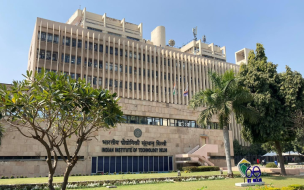To bridge this gap, the University of Delhi's (DU) School of Commerce has introduced a full-time 2-year MBA program in business analytics.
Ajay Kumar Singh, Head of DU’s Department of Commerce said, “The Department of Commerce, University of Delhi, has carefully designed this comprehensive MBA (Business Analytics) program with its unwavering commitment to excellence and a deep understanding of the emerging demands of the industry.
“It aims to produce exceptional business professionals equipped with the skills and knowledge required to lead and succeed in today’s competitive world.”
We’ll explore the admissions criteria for the MBA in Business Analytics as well as the curriculum, but first: Why study an MBA in Business Analytics in the first place?
Why MBA in Business Analytics?
One of the main reasons to pursue an MBA in Business Analytics in India is the salary options available after you graduate. Thanks to the shortage of skills in this area, many employers are willing to pay well for this work.
According to Glassdoor, the average salary for a business analyst in India is INR 1,000,000. This is around three times the average income in India.
Business analytics skills are also highly versatile and can be applied in many different industries and companies. This means that studying in a program like the DU MBA in Business Analytics can give you diverse career options.
Finally, an MBA in Business Analytics will not only give you analytics skills but greater insight into business as a whole, thanks to the MBA teaching. This will benefit your career in the long run.
Let’s take a look at what the DU MBA in Business Analytics teaches students.
MBA in Business Analytics subjects
In alignment with the goals outlined in the National Education Policy, DU’s MBA in Business Analytics adheres to an outcome-based academic approach. This mandates that the institution outline the purpose and expected learning outcomes for each topic or material covered within the course curriculum.
The program takes place over two years, split into four semesters, during which time students complete core and elective courses.
Core curriculum
The core curriculum on the MBA in Business Analytics at DU covers essential topics in business analytics.
These include introductions to analytics and accounting for managers. They also include specialized courses in topics like:
- Indian knowledge systems
- Data warehousing and data mining
- Supply chain analytics
Electives
In addition to the core curriculum, students can choose one course from each of two lists of electives.
The first type is “open elective” courses. These optional modules are open to the entire student body provided they meet the eligibility criteria.
The open electives available include teaching business basics like accounting and financial markets, as well as more specific subjects such as business analysis using financial statements and investment management.
The second type is ordinary elective courses, which are specific to the MBA in Business Analytics cohort. These cover many innovative business topics, including subjects like:
- Internet of Things
- Advanced Machine Learning
- Predictive Analytics
- Robotic Process Automation in Business
Students typically make their selections at the beginning of the third semester. The availability of these courses may depend on faculty availability and the minimum number of students opting for a particular course.
DU MBA in Business Analytics Course Fees
How much does it cost to study all of the above? The course fee for Indian students enrolling in the MBA in Business Analytics program is as follows:
- Tuition Fees: INR 1,000
- University Student Welfare Fund: INR 100
- Faculty/Department/Centre/College/Student Welfare Fund: INR 9,080
- University Development Fund: INR 900
- University Facilities and Services Charges: INR 500
- Faculty/Department/Centre/College/Facilities and Services Charges: INR 36,320
- Economically Weaker Section Support University Fund: INR 100
- Delhi University Students Union (DUSU) Fund: INR 48,000
This comes to a total of INR 96,000 – not a bad investment considering the average salaries of business analysts in India.
For foreign students, the annual fee is US$ 3,500.
So far, we’ve covered the course curriculum and the cost of DU’s MBA in Business Analytics – now it’s time to look at admission requirements.
DU MBA in Business Analytics Admission Requirements
As an internationally recognized university, the University of Delhi attracts many international students. Therefore, the school offers different entry criteria for Indian students and foreign nationals.
Admission Criteria for Indian Students
Admission to DU’s MBA in Business Analytics is primarily determined by the Common Aptitude Test (CAT) score. The admission process allocates 80% of the weighting to the CAT scores of the students. The remaining 20% of the weightage is evenly divided between the marks obtained in Class 10 and Class 12.
In addition to presenting their CAT score, candidates must have passed a bachelor’s degree examination from the University of Delhi or an equivalent recognized institution in any discipline. A minimum of 50% marks in aggregate or its equivalent in the grading system is required for eligibility.
Candidates in their final year of bachelor’s degree are eligible to apply. However, their admission will be contingent upon meeting the minimum eligibility criteria and providing the necessary documentation at the time of admission.
Relaxation in eligibility criteria is available for students from reserved categories, for instance, people with disabilities.
Admission Criteria for Foreign Nationals
All foreign nationals, even those who have completed their schooling from an Indian board, are considered foreign students for registration and admission purposes. They can compete for admission under the 5% quota reserved for foreign students.
To apply, foreign nationals must meet five requirements:
- GMAT: Foreign nationals can apply using their GMAT score, which must meet a mandatory minimum. This was previously set at 650 but will change with the new GMAT Focus Edition exam which was launched in autumn 2023 and will be the only available GMAT exam from February 2024.
- Consulate/Embassy Application: Foreign nationals with Indian or foreign degrees who are not residing in India must apply through their respective consulate or embassy.
- Fellowship Requirement: Such candidates should have a fellowship from their country of origin and/or recognized international agencies.
- TOEFL Scores: Foreign nationals with foreign degrees are required to submit both GMAT and TOEFL scores for admission.
Studying for an MBA in Business Analytics at the University of Delhi is a smart investment in your skills and your future. Find out more about studying business analytics here.
Cover image © Rebecca Brown on Flickr, reproduced under this license.







